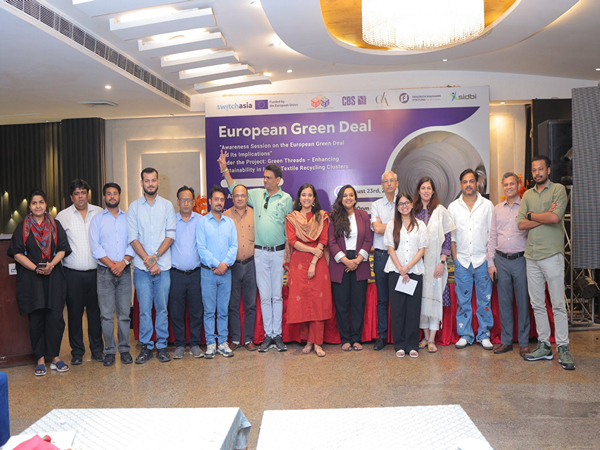
Foundation for MSME Clusters Leads Panipat's Green Transformation
Aug 25, 2025
NewsVoir
Panipat (Haryana) [India], August 25: The Foundation for MSME Clusters (FMC), as the implementing partner of the "Green Threads" programme funded by the European Union under its SWITCH-Asia initiative, in collaboration with the Panipat Exporters Association, organized a pivotal workshop at Days Hotel by Wyndham, Panipat. The session was designed to equip exporters with knowledge of the European Union's fast-evolving sustainability guidelines for textiles and apparel, particularly around compliance, traceability, and environmental accountability. The event was graced by Lalit Goyal, President, Panipat Exporters Association; Vinod Dhamija, President, Haryana Chamber of Commerce and Industry; Rajat Grover, President, Young Entrepreneurs Society; Puran Rawal, Vice President, Young Entrepreneurs Society; and Parvinder Singh, Director, Global Alliance for Textile Sustainability (GATS), Nitin Arora, President, Dyer Association, whose participation underscored strong industry support for Panipat's green transition.
Opening the session, Mukesh Gulati, Executive Director of FMC, underscored the urgent need for Panipat's exporters to align with international sustainability standards while reaffirming FMC's commitment to guiding the city's transformation into a global hub for circular textiles. He emphasized that FMC is not here merely as an outside expert, but as a long-term partner working hand in hand with Panipat's industries to ensure sustained progress, with the goal of taking the cluster at least two steps higher than where it stands today.
The urgency of these changes stems from the existing global textile crisis, where the fashion industry is responsible for nearly 10% of global carbon emissions, 20% of wastewater pollution, and generates 92 million tonnes of textile waste annually. With fast fashion driving overconsumption, less than 1% of textiles worldwide are currently recycled back into new garments. In response, the European Union has introduced stricter sustainability and circularity rules to curb overproduction, demand traceability, and ensure garments entering the EU are durable, recyclable, and environmentally responsible. For Panipat, which recycles a major share of India's textile waste and exports to global markets, these guidelines are not just regulatory hurdles but a critical opportunity to modernize and lead.
The workshop featured leading international voices driving fashion sustainability. Harshita from Global Fashion Agenda (GFA) shared insights on the EU textile strategy, covering new requirements for eco-design, durability, and the upcoming Digital Product Passport (DPP) that will soon be mandatory for apparel entering EU markets. Ina Bahungna from Reverse Resources presented traceability mechanisms that enable exporters to map textile waste flows and comply with the EU's Extended Producer Responsibility (EPR) framework. Chinky Yadav from Green Story demonstrated the importance of Digital Product Passport (DPP) in tracing the product's lifestyle, from its creation to manufacturing and distribution. The mechanism allows for maintaining how environmentally-sustainable the stages were like water usage, recycling, repair, etc. The DPP will have businessowners to make informed choices.
The Green Threads programme funded by the European Union under Switch Asia Programme is delivered by a strong consortium of global and national partners: Foundation for MSME Clusters (FMC) as the implementing partner in Panipat; Copenhagen Business School (CBS) leading academic research on sustainability branding and traceability; the Small Industries Development Bank of India (SIDBI) enabling green financing for MSMEs; Global Fashion Agenda (GFA) advancing policy and industry engagement; Reverse Resources providing cutting-edge traceability technology.
Together, the consortium aims to establish Panipat as a global sustainable textile hub, introduce the Digital Product Passport for greater transparency, enhance MSME skills and technology for resource efficiency, and expand access to green financing through equity, lending, and grants.
The workshop drew strong participation from Panipat's exporters, HR leaders, and compliance managers, who gained clarity on upcoming EU mandates, carbon tax implications, and opportunities for green financing. With Green Threads, funded by the European Union under its SWITCH-Asia programme, Foundation for MSME Clusters and its consortium partners CBS, SIDBI, GFA, Reverse Resources, and Green Story are ensuring that Panipat is not left behind in the global shift toward sustainable textiles, but instead emerges as a leader in circular fashion, strengthening India's position in the international market.
Foundation for MSME Clusters (FMC), a leading non-governmental, not-for-profit public charitable trust, established in India in 2005. FMC has made remarkable strides in fostering sustainable livelihoods and environmental progress through our innovative cluster development approach. Our work spans more than 300 MSME clusters, supporting over 100,000 artisanal and industrial units, ranging from household operations to medium-sized production entities. As an empanelled Nodal Agency with the Ministries of MSMEs and Rural Development, FMC extends support to prominent schemes like SFURTI, and is also providing technical, research, and evaluation support to various organizations such as SIDBI & KVIC. FMC has implemented multiple projects on environment and livelihoods with support from agencies like NABARD, UNIDO, UNDP, EU, ADB, and major corporates such as Cisco, Mahindra Finance, HCL, Yes Bank, and Hindalco.
(ADVERTORIAL DISCLAIMER: The above press release has been provided by NewsVoir. ANI will not be responsible in any way for the content of the same)





